
A prisoner of war (POW) is a person who is held captive by a belligerent power during or immediately after an armed conflict. The earliest recorded usage of the phrase "prisoner of war" dates back to 1610.

A Vietnam veteran is an individual who performed active military, naval, or air service in the Republic of Vietnam during the Vietnam War.

Douglas Brian "Pete" Peterson is an American politician and diplomat. He served as a United States Air Force pilot during the Vietnam War and spent over six years as a prisoner of the North Vietnamese army after his plane was shot down. He returned to Hanoi when he became the first United States Ambassador to Vietnam in 1997. He was an ambassador until July 2001, after which he devoted himself to philanthropic work.

Floyd James "Jim" Thompson was a United States Army colonel. He was one of the longest-held American prisoners of war, spending nearly nine years in captivity in the forests and mountains of South Vietnam, Laos, and North Vietnam during the Vietnam War.

Estimates of casualties of the Vietnam War vary widely. Estimates can include both civilian and military deaths in North and South Vietnam, Laos, and Cambodia.
The "Winter Soldier Investigation" was a media event sponsored by the Vietnam Veterans Against the War (VVAW) from January 31, 1971, to February 2, 1971. It was intended to publicize war crimes and atrocities by the United States Armed Forces and their allies in the Vietnam War. The VVAW challenged the morality and conduct of the war by showing the direct relationship between military policies and war crimes in Vietnam. The three-day gathering of 109 veterans and 16 civilians took place in Detroit, Michigan. Discharged servicemen from each branch of the armed forces, as well as civilian contractors, medical personnel and academics, all gave testimony about war crimes they had committed or witnessed during the years 1963–1970.
Robert Russell Garwood is a former United States Marine. Often cited as the last verified American prisoner of war (POW) from the Vietnam War, Garwood was captured on September 28, 1965 by Việt Cộng forces near Da Nang, Quang Nam Province. He was taken to North Vietnam in 1969, and although he was reportedly released in 1973 along with the other U.S. POWs as part of the Paris Peace Accords, he did not return to the United States until March 22, 1979.
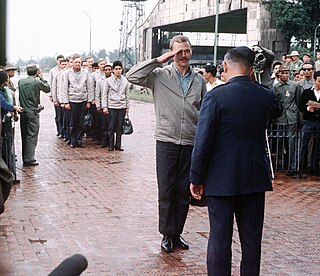
Operation Homecoming was the return of 591 American prisoners of war (POWs) held by North Vietnam following the Paris Peace Accords that ended U.S. involvement in the Vietnam War.
The Senate Select Committee on POW/MIA Affairs was a special committee convened by the United States Senate during the George H. W. Bush administration to investigate the Vietnam War POW/MIA issue, that is, the fate of United States service personnel listed as missing in action during the Vietnam War. The committee was in existence from August 2, 1991 to January 2, 1993.
The Vietnam War POW/MIA issue concerns the fate of United States servicemen who were reported as missing in action (MIA) during the Vietnam War and associated theaters of operation in Southeast Asia.
Tens of thousands of South Korean soldiers were captured by North Korean and Chinese forces during the Korean War (1950–1953) but were not returned during the prisoner exchanges under the 1953 Korean Armistice Agreement. Most are presumed dead, but the South Korean government estimated in 2007 that some 560 South Korean prisoners of war (POWs) still survived in North Korea. The issue of unaccounted South Korean POWs from the Korean War has been in dispute since the 1953 armistice. North Korea continues to deny that it holds these South Korean POWs. Interest in the issue has been renewed since 1994, when Cho Chang-ho, a former South Korean soldier presumed to have been killed in the war, escaped from North Korea. As of 2008, 79 former South Korean soldiers had escaped from North Korea.

John Heaphy "Jack" Fellowes was a U.S. Navy captain, pilot who became a prisoner of war (POW) during the Vietnam War. He was known as "Happy Jack" because of his infectious sense of humor, which he maintained even while a POW. He was awarded the Silver Star for his "conspicuous gallantry and intrepidity" while a POW, credited with "contributed significantly toward the eventual abandonment of harsh treatment by the North Vietnamese".
Evelyn Fowler Grubb was the wife of an American Vietnam War Air Force pilot who became a prisoner of war, she was also a co-founder and then later served as the national coordinator of the National League of Families, a nonprofit organization that worked on behalf of Vietnam-era Missing in Action (MIA) and Prisoner of War (POW) Families. Grubb also oversaw the creation of the famous "You Are Not Forgotten" POW/MIA flag that still flies in front of all U.S. Post Offices, many firehouses and police stations, all major U.S. Military installations as well as most veterans organization chapters in the United States.
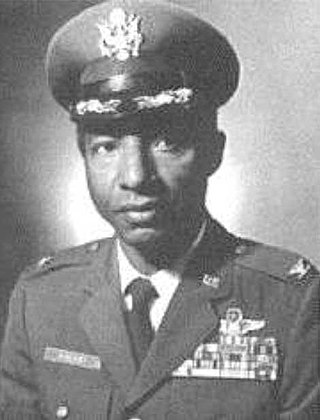
Fred Vann Cherry was a colonel and command pilot in the U.S. Air Force. A career fighter pilot, he served in the Korean War and the Vietnam War.
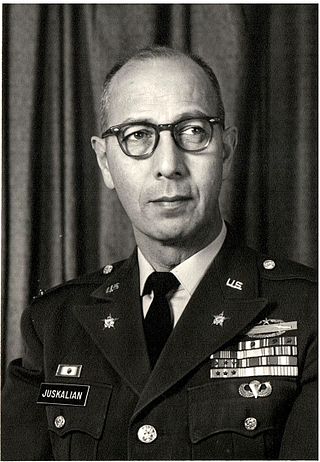
George Juskalian was a decorated member of the United States Army who served for over three decades and fought in World War II, the Korean War and the Vietnam War. Following graduation from Boston University, Juskalian entered the army as a second lieutenant in June 1936. During World War II, he served with the infantry during the North African Campaign and took part in Operation Torch. At the Battle of the Kasserine Pass, he was captured by German troops and became a prisoner of war (POW) for twenty-seven months. During the Korean War he commanded an infantry battalion. He was then stationed in Tehran where he acted an advisor to the Imperial Iranian Army throughout 1957 and 1958. During the Vietnam War, Juskalian once again undertook advisory duties, working with the South Vietnamese Army between 1963 and 1964, before serving as the MACV inspector general under General William Westmoreland.
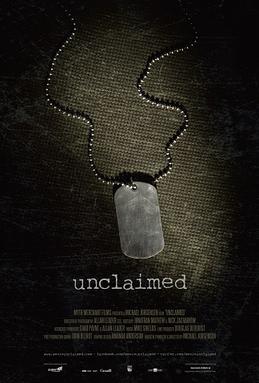
Unclaimed is a 2013 Canadian documentary film about a man who claims to be former Special Forces Green Beret Master Sgt. John Hartley Robertson, who was declared dead after being shot down over Laos on a classified mission on 20 May 1968. The documentary is written, directed, and produced by Michael Jorgensen. It follows Tom Faunce, a veteran of the Vietnam War, in tracking down the man who claimed to be Robertson. Faunce was skeptical of Robertson's identity but eventually became convinced. He convinced Jorgensen to make a documentary about Robertson's story as a way to unite the man with his American family.
There were many members of the United States armed forces who were held as prisoners of war (POWs) in significant numbers during the Vietnam War from 1964 to 1973. Unlike U.S. service members captured in World War II and the Korean War, who were mostly enlisted troops, the overwhelming majority of Vietnam-era POWs were officers, most of them Navy, Air Force, and Marine Corps airmen; a relatively small number of Army enlisted personnel were also captured, as well as one enlisted Navy seaman, Petty Officer Doug Hegdahl, who fell overboard from a naval vessel. Most U.S. prisoners were captured and held in North Vietnam by the People's Army of Vietnam (PAVN); a much smaller number were captured in the south and held by the Việt Cộng (VC). A handful of U.S. civilians were also held captive during the war.
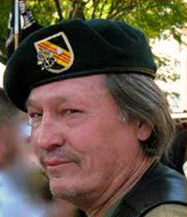
Theodore Lane Sampley was an American Vietnam War veteran and activist. He primarily advocated for those servicemembers still considered missing in action or prisoners of war (POW-MIA) as of the end of hostilities in 1975. A staunch political conservative, he also ran for local political office several times. He is credited with the research that identified Air Force Lt. Michael Blassie as the Vietnam fatality buried at the Tomb of the Unknown Soldier, and for his role in organizing the annual Rolling Thunder motorcycle event in Washington. In Kinston, North Carolina, where he lived for much of his adult life, he was known for his local civic activism, most notably his effort to build a replica of the Confederate ironclad CSS Neuse, the only full-size replica of a Confederate ironclad, in the city's downtown.

Waging Peace in Vietnam: U.S. Soldiers and Veterans Who Opposed the War is a non-fiction book edited by Ron Carver, David Cortright, and Barbara Doherty. It was published in September 2019 by New Village Press and is distributed by New York University Press. In March 2023 a Vietnamese language edition of the book was launched at the War Remnants Museum in Ho Chi Minh City, Vietnam.












